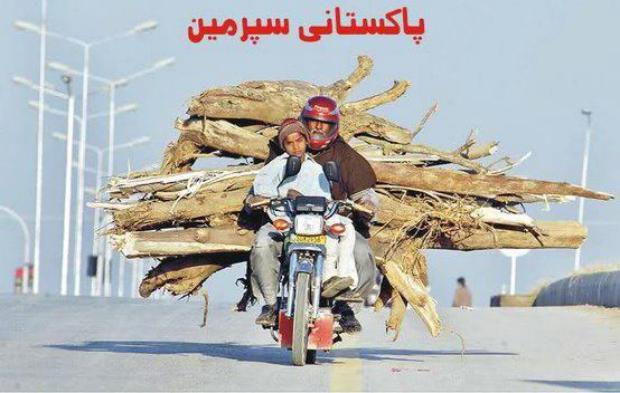Pakistani Funny Pics Biography
Source:- Google.com.pk
Welcome to PakEarn.com (Facebook Photo Posting Jobs)
Faryal Gohar is an acclaimed Pakistani actress, television writer, human right activist from Karachi, Sindh, Pakistan. Faryal Gohar was married to artist Jamal Shah; the couple is now divorced.
Biography
Daughter of well known social scientist and enthropologist Khadija Ali Gohar, younger sister of Madiha Gohar and Amir Ali gohar, Faryal studied in American International School, Kinnaird College Lahore and McGill University Canada. Her contributions to poverty alleviation were appreciated by the Planning Commission of Pakistan.
Feryal is the youngest child of dynamic, accomplished parents. Her late mother, Khadija Gauhar, was a leading intellectual in Lahore who came to the city from South Africa after marrying her father, Sayyid was a military man from the NWFP who later retired from the army and took to farming. Her elder sister, Madiha Gauhar, is a talented theatre personality who founded the Ajoka theatre group and has managed it for over two decades. Feryal was initially associated with Ajoka as its first female actor. The sisters also have an older brother, Aamir, an industrial engineer who operates a business in alternative energy products.
Early life
As a young woman Feryal attended the Lahore American School. Her experiences there included a reaction to the school’s requirement that all students, regardless of nationality, pledge allegiance to the United States. In response to this practice, the eight year old Feryal insisted that the Pakistani national anthem be played for the entire school as well. Later, Feryal was the first Pakistani and first female to head the school’s Students Council. She was an honour role student and captain of several sports teams. Several scions of leading feudal families at Aitchison College at that time remember Feryal leading her team into the school grounds to play soccer. What they especially remember is the soccer team uniform which revealed a rather shapely pair of legs. “Some have never forgotten that sight,” she chuckles.
Feryal followed her college years with a brief stint at Kinnaird, where she played basketball and acted. She then studied political economy at McGill University and was trained in documentary film production in Europe and later at the University of Southern California. Upon her return to Pakistan, Feryal married artist and sculptor, Jamal Shah. In 1984 Feryal moved with Jamal to Quetta where she braved a conservatism that required her to veil herself and threatened physical harm if she appeared on television. This was not an easy phase in Feryal’s life. She explains the end of her first marriage saying, “Jamal had aspirations which did not include me.” It was Feryal’s commitment to her marriage and her politics that enabled her to cope with life in the most remote neglected part of Baluchistan. Thus, she found it ironic that her husband took the first opportunity he had to get out of the marriage “and never looked back.”
Personal life
After her split from Jamal Shah, Gauhar married a successful Pakistani doctor practicing in California. Feryal divided her time in those years between America and Pakistan. Her experience in California was bittersweet, ending with her second divorce. It was in California that Feryal became a serious writer. The isolation she felt there, while painful, sparked her career. Feeling isolated in small town America, Feryal turned to writing for remedy and release. Writing at this time meant salvation. “Words, for me, are a balm. They soothe me when the anguish is too deep,” she explained in an interview given last year. In addition to her fiction work, Gauhar has been a magazine writer and newspaper columnist for twenty six years.
Career
Referencing the characters of her novels at the 2006 Afro-Asian Writer’s Conference in Dehli, Feryal commented
I am an empty shell in whom many lives, met and unmet, live. What is autobiographical [in my work] is what comes from the personal space. Many times, I do not create the characters, they create me. I also write a political column, which is personal too. My marriage between my personal, professional and political lives is the most successful one yet.
As the interview continued the light of early January waned, and our shadows stretched along Feryal’s expansive, neatly scaped lawn. Feryal passed a small plate of dried fruit and offered home brewed coffee. She shared details of her impending trip to India for the Jaipur Heritage International Festival where she was invited as a speaker alongside South Asian luminaries such as Vikram Seth, Kiran Desai and Salman Rushdie. Requests such as this are largely the result of her first novel, The Scent of Wet Earth in August, which was widely acclaimed. The work is a remarkable blend of Feryal’s filmmaking sensibilities, consciousness of the “other” and her knowledge of animal behaviour. The novel was published by Penguin in 2002 and reached fifth on The New York Times international bestseller list.
Scent is based on Feryal’s film Tibbi Galli. The work reveals the endangered lives of outcasts living in the Lahore red-light district. The choiceless-ness Feryal’s characters encounter there is woven into lucid, at times heart wrenching prose. The plot is unconventional, the mood somber. The novel centers on the protagonist, Fatima, a mute girl who falls in love with the local maulvi’s protege, and the tragedy that ensues.
Gauhar’s forthcoming book, No Space for Further Burials, is set in the wild, violent terrain of contemporary Afghanistan and concerns the socio-political situation there. No Space explores the deaths suffered by Afghans and Americans. Captivated by the subject matter, she penned the book in several weeks. Before 2001, No Space was intended to be a film script. It was inspired by both the fallout of the 1989 Soviet pullout from Afghanistan and the three year war between the Serbians and Bosnians that began in 1992. The 2001 World Trade Tower attacks and their impact on Afghanistan added another dimension to the novel.
No Space is the diary of a US Army medical technician incarcerated by warlords in a mental hospital in Afghanistan. “I wanted to reverse the experience of looking at America through my eyes. I wanted Afghanistan to be seen through an American’s eyes,” the author explains. No Space for Further Burials will be released by Women Unlimited Press in March. A French publisher has purchased its rights and translations are underway in Dari, Pushto and Spanish. Finally, the work is being translated to film. Gauhar recently returned from a writer’s residency at Sanskriti Kendra, near Delhi, where she has been writing the screenplay. She hopes to go into production by the end of the year.
In addition to her novels and plays, Feryal has produced several works of non-fiction. Several years ago she completed a documentary simply titled, Pakistan Poverty Assessment. The work was the result of research from 54 districts and concerned the poor’s perception of their poverty. It underscored the need for land redistribution in the country. Almost immediately after its release the Prime Minister announced that there would be no further land reform in the country. Feryal remained undaunted. “My task was to get the message across through the voices of the poor, and I did it and it was heard quite clearly,” she comments.
Pakistani Funny Pics Funny Pics of Anything With Captons for Fb For Kids Tumblr for Facebook of People of Animals for Instagram and Quotes

Pakistani Funny Pics Funny Pics of Anything With Captons for Fb For Kids Tumblr for Facebook of People of Animals for Instagram and Quotes

Pakistani Funny Pics Funny Pics of Anything With Captons for Fb For Kids Tumblr for Facebook of People of Animals for Instagram and Quotes

Pakistani Funny Pics Funny Pics of Anything With Captons for Fb For Kids Tumblr for Facebook of People of Animals for Instagram and Quotes

Pakistani Funny Pics Funny Pics of Anything With Captons for Fb For Kids Tumblr for Facebook of People of Animals for Instagram and Quotes

Pakistani Funny Pics Funny Pics of Anything With Captons for Fb For Kids Tumblr for Facebook of People of Animals for Instagram and Quotes

Pakistani Funny Pics Funny Pics of Anything With Captons for Fb For Kids Tumblr for Facebook of People of Animals for Instagram and Quotes

Pakistani Funny Pics Funny Pics of Anything With Captons for Fb For Kids Tumblr for Facebook of People of Animals for Instagram and Quotes

Pakistani Funny Pics Funny Pics of Anything With Captons for Fb For Kids Tumblr for Facebook of People of Animals for Instagram and Quotes

Pakistani Funny Pics Funny Pics of Anything With Captons for Fb For Kids Tumblr for Facebook of People of Animals for Instagram and Quotes

Pakistani Funny Pics Funny Pics of Anything With Captons for Fb For Kids Tumblr for Facebook of People of Animals for Instagram and Quotes

Pakistani Funny Pics Funny Pics of Anything With Captons for Fb For Kids Tumblr for Facebook of People of Animals for Instagram and Quotes

Pakistani Funny Pics Funny Pics of Anything With Captons for Fb For Kids Tumblr for Facebook of People of Animals for Instagram and Quotes

Pakistani Funny Pics Funny Pics of Anything With Captons for Fb For Kids Tumblr for Facebook of People of Animals for Instagram and Quotes

No comments:
Post a Comment